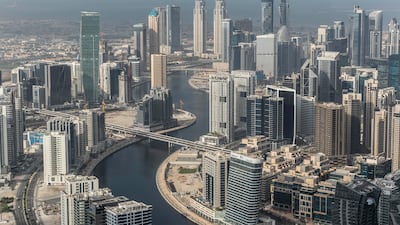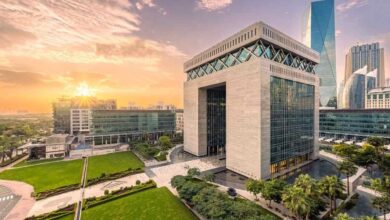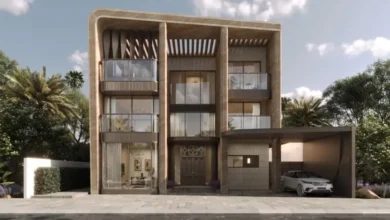
Coming interest rate cuts by the US Federal Reserve and, subsequently, the UAE Central Bank are expected to make mortgages more affordable for end users.
The Fed has held its benchmark rate steady since July 2023. The central banks of the UAE and Saudi Arabia, which follow the Fed’s decisions, have also held their interest rates steady.
If interest rates go down, an increasing number of people will potentially be eligible for mortgages, according to Yash Trivedi, founder of mortgage advisory company YouAE Mortgages.
“For instance, someone currently eligible for a Dh1 million [$272,294] mortgage will qualify for a Dh1.2 million mortgage if interest rates go down,” he says.
“The move will have an overall impact on affordability. Someone who is not eligible for a mortgage today may qualify for a home loan in six months.”
He expects a quicker uptake of smaller properties such as studios and one and two-bedroom apartments.
Middle-income professionals who earn between Dh12,000 and Dh20,000, and are currently not eligible for a mortgage due to the increase in property prices, will benefit from a rate cut as they will qualify for a higher loan amount, Mr Trivedi adds.
The Federal Reserve may begin cutting interest rates for the first time in four years at its meeting on September 17 and September 18.
Most central banks in the GCC follow the Fed’s policy rate moves due to their currencies being pegged to the US dollar.
The Federal Open Market Committee has kept the federal funds rate at 5.25 per cent to 5.5 per cent since July 2023, but markets are now heavily favouring a quarter-of-a-percentage-point cut in September.
Traders have fully priced in a Fed easing for next month, with a 67 per cent chance of a 25-basis-point cut and about 33 per cent chance of a bigger 50bps reduction, according to the CME FedWatch tool.
Interest rates in the UAE last year have hovered between 4 per cent and 4.5 per cent, Mr Trivedi says.
Because the market is competitive, interest rates are not too different across banks and mortgages are sold at a negative spread, he says.
“Since banks have already priced in Fed rate cuts, I don’t expect them to aggressively reduce interest rates, except maybe a 25bps reduction,” he adds.
Arran Summerhill, chief operating officer of mortgage consultants Holo, says that although he has not historically seen a significant impact on mortgage interest when rates change in the Emirates, the desire for homeownership remains strong, driven by factors such as rental price increases outpacing property values.
While the real-life savings from a 0.25 per cent rate cut may be negligible, it could influence some buyers, he reckons.
“We’ve observed a steady flow of inquiries even ahead of the anticipated September rate cut. While some customers have referenced the potential rate changes, the primary driver for increased applications is typically the return of residents to the UAE after the summer break,” Mr Summerhill says.
He believes the reduction in interest rates will provide only a marginal increase in spending power for borrowers.
The average loan size in the UAE is about Dh2 million, with properties of interest to end-users ranging from Dh2.5 million to Dh3 million, says Mr Summerhill.
For a 25-year loan of Dh2 million, a 0.25 per cent rate cut would result in a monthly saving of about Dh300, he points out.
Rajender Prasad, managing director of Money Maestro mortgage consultancy, says property purchases are now primarily need-based, with most home buyers being end-users.
There is a diverse range of buyers, from first-time purchasers to those upgrading their homes, he says.
“The anticipated rate cut is likely to encourage more activity in the small to mid-segment property market, particularly in the range of Dh2.5 million. In this price range, buyers can find good two to three-bedroom apartments or townhouses, even in the secondary market,” Mr Prasad says.
Mr Summerhill believes increased competition among banks, probably resulting in new rate or fee reductions, will further stimulate the market.
“Refinance inquiries remain consistent throughout the year, regardless of anticipated interest rate changes,” he says.
“When considering refinancing, it’s essential to conduct a cost-benefit analysis, as there are associated exit fees with any current mortgage and new loan costs that can exceed Dh20,000.”
Mr Prasad also does not expect immediate excitement for refinancing among customers until the rate cut is officially announced and they can see the exact figures.
For those whose fixed-rate terms are ending soon or who are considering refinancing, it is crucial to compare the overall calculations, he warns.
This allows them to evaluate their current mortgage against the new proposals. Therefore, this segment is expected to wait until UAE banks declare the updated pricing.

Indian homeowner Shalini Agarwal is waiting to see the extent of rate cuts before deciding what to do with her property.
She obtained a fixed interest rate of 3.97 per cent for two years for a mortgage from United Arab Bank to purchase an apartment in Dubai this year.
“If rates fall, I will refinance my existing mortgage and this will help to finish my home loan earlier. If the rate goes up after the lock-in period is over and I am not able to afford it, then I will be forced to sell the property,” she says.
“I bought a villa in The Springs, Dubai, in 2021 when interest rates were only 2.67 per cent. However, I was forced to sell the villa because after the lock-in period of two years ended, the interest rate on my mortgage went up.”
Ms Agarwal has currently leased her apartment and the rent covers the loan instalment. She bought the property with the hope of living in it after interest rates drop.
“I didn’t stop buying property because if I wait for interest rates to drop, then prices will continue go up,” she says.
“Banks are very competitive and are vying to give me a fixed rate of interest for a certain time. Rather than wait for rates to drop, I can compare between banks and get a good deal.”
Meanwhile, Lewis Allsopp, chairman of real estate company Allsopp & Allsopp Group, says the anticipated interest rate reductions are expected to result in increased demand for UAE properties.
For a 25-year loan of Dh2 million, a 0.25 per cent rate cut would result in a monthly saving of roughly Dh300
Arran Summerhill, chief operating officer of Holo
If interest rates decrease, the cost of borrowing becomes more affordable, making property ownership more attractive to buyers, particularly first-time buyers.
Lowered rates are also expected to create a more competitive market as buyers who were previously on the sidelines become more active in their search, he says.
“However, it is important to note that the actual impact on monthly payments is dependent on how much the interest rates are lowered, and whether or not we will have an increase in property prices,” he warns.
“If lowered rates drive demand and price increases, the overall impact on monthly payments may end up being minimal.”
Lowered interest rates are expected to drive property purchase demand from both investors and end-users, he says.
Investors may find the current market conditions particularly attractive as they can leverage mortgage financing to potentially buy several properties. Some investors may also see this as an opportunity to diversify their portfolios, getting returns across a spread of properties, Mr Allsopp says.
For end-users, lower interest rates directly affect their monthly mortgage payments, making homeownership more affordable overall. Additionally, if rents increase, there could be a stronger appetite from end-users to invest in a house rather than rent.
“We may see increased activity from first-time buyers or end users deciding to upsize or upgrade to their next home if the interest rates are attractive enough,” he says.
“We might particularly see more attention on properties that have the potential to renovate or modernise. With reduced rates, more buyers can use mortgages more strategically, freeing up funds to invest in property improvements or upgrades. This could lead to a higher selling price if they decide to sell the property in the future.”





